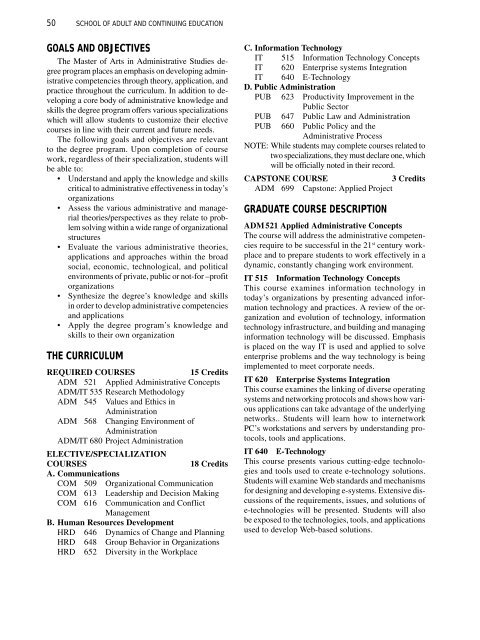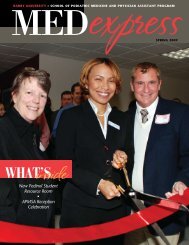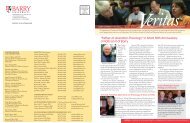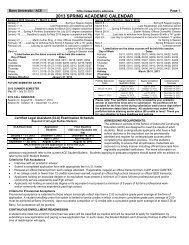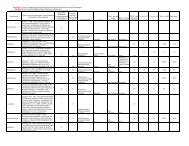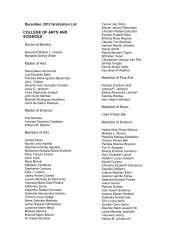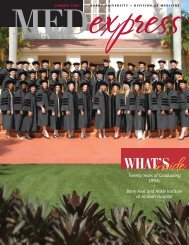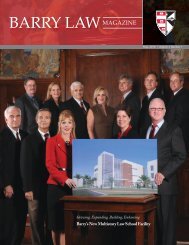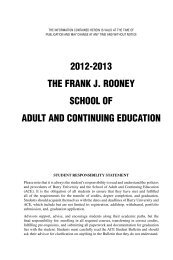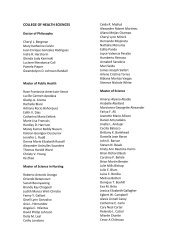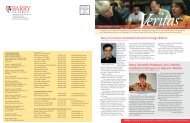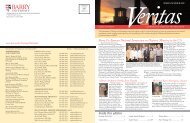2004-2005 - Barry University
2004-2005 - Barry University
2004-2005 - Barry University
Create successful ePaper yourself
Turn your PDF publications into a flip-book with our unique Google optimized e-Paper software.
50<br />
SCHOOL OF ADULT AND CONTINUING EDUCATION<br />
GOALS AND OBJECTIVES<br />
The Master of Arts in Administrative Studies degree<br />
program places an emphasis on developing administrative<br />
competencies through theory, application, and<br />
practice throughout the curriculum. In addition to developing<br />
a core body of administrative knowledge and<br />
skills the degree program offers various specializations<br />
which will allow students to customize their elective<br />
courses in line with their current and future needs.<br />
The following goals and objectives are relevant<br />
to the degree program. Upon completion of course<br />
work, regardless of their specialization, students will<br />
be able to:<br />
• Understand and apply the knowledge and skills<br />
critical to administrative effectiveness in today’s<br />
organizations<br />
• Assess the various administrative and managerial<br />
theories/perspectives as they relate to problem<br />
solving within a wide range of organizational<br />
structures<br />
• Evaluate the various administrative theories,<br />
applications and approaches within the broad<br />
social, economic, technological, and political<br />
environments of private, public or not-for –profit<br />
organizations<br />
• Synthesize the degree’s knowledge and skills<br />
in order to develop administrative competencies<br />
and applications<br />
• Apply the degree program’s knowledge and<br />
skills to their own organization<br />
THE CURRICULUM<br />
REQUIRED COURSES 15 Credits<br />
ADM 521 Applied Administrative Concepts<br />
ADM/IT 535 Research Methodology<br />
ADM 545 Values and Ethics in<br />
Administration<br />
ADM 568 Changing Environment of<br />
Administration<br />
ADM/IT 680 Project Administration<br />
ELECTIVE/SPECIALIZATION<br />
COURSES<br />
A. Communications<br />
18 Credits<br />
COM 509 Organizational Communication<br />
COM 613 Leadership and Decision Making<br />
COM 616 Communication and Conflict<br />
Management<br />
B. Human Resources Development<br />
HRD 646 Dynamics of Change and Planning<br />
HRD 648 Group Behavior in Organizations<br />
HRD 652 Diversity in the Workplace<br />
C. Information Technology<br />
IT 515 Information Technology Concepts<br />
IT 620 Enterprise systems Integration<br />
IT 640 E-Technology<br />
D. Public Administration<br />
PUB 623 Productivity Improvement in the<br />
Public Sector<br />
PUB 647 Public Law and Administration<br />
PUB 660 Public Policy and the<br />
Administrative Process<br />
NOTE: While students may complete courses related to<br />
two specializations, they must declare one, which<br />
will be officially noted in their record.<br />
CAPSTONE COURSE 3 Credits<br />
ADM 699 Capstone: Applied Project<br />
GRADUATE COURSE DESCRIPTION<br />
ADM521 Applied Administrative Concepts<br />
The course will address the administrative competencies<br />
require to be successful in the 21st century workplace<br />
and to prepare students to work effectively in a<br />
dynamic, constantly changing work environment.<br />
IT 515 Information Technology Concepts<br />
This course examines information technology in<br />
today’s organizations by presenting advanced information<br />
technology and practices. A review of the organization<br />
and evolution of technology, information<br />
technology infrastructure, and building and managing<br />
information technology will be discussed. Emphasis<br />
is placed on the way IT is used and applied to solve<br />
enterprise problems and the way technology is being<br />
implemented to meet corporate needs.<br />
IT 620 Enterprise Systems Integration<br />
This course examines the linking of diverse operating<br />
systems and networking protocols and shows how various<br />
applications can take advantage of the underlying<br />
networks.. Students will learn how to internetwork<br />
PC’s workstations and servers by understanding protocols,<br />
tools and applications.<br />
IT 640 E-Technology<br />
This course presents various cutting-edge technologies<br />
and tools used to create e-technology solutions.<br />
Students will examine Web standards and mechanisms<br />
for designing and developing e-systems. Extensive discussions<br />
of the requirements, issues, and solutions of<br />
e-technologies will be presented. Students will also<br />
be exposed to the technologies, tools, and applications<br />
used to develop Web-based solutions.


